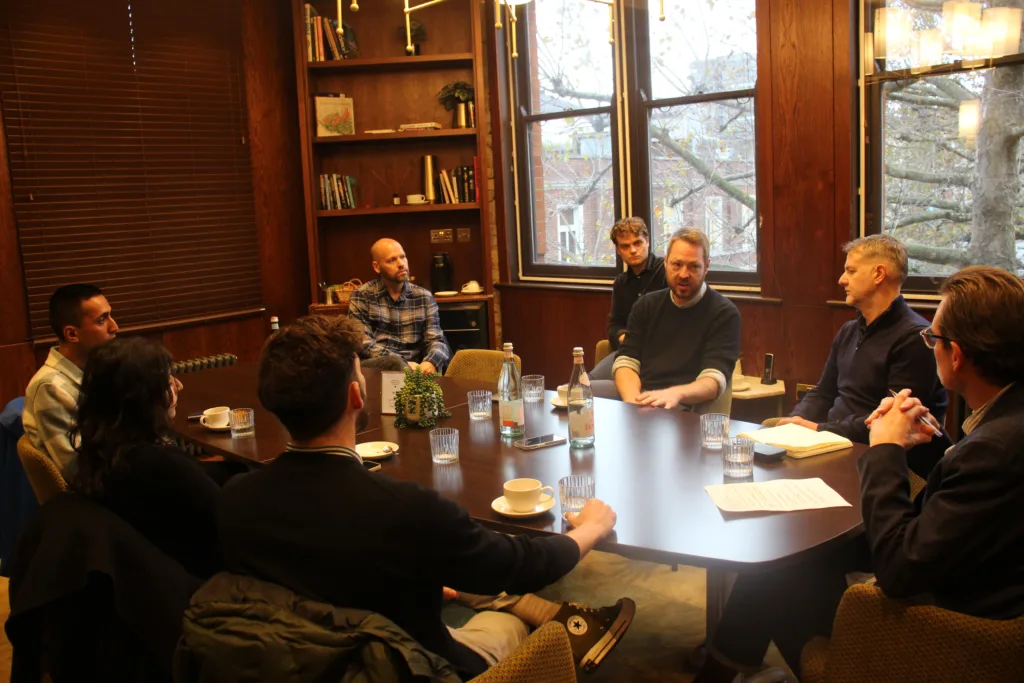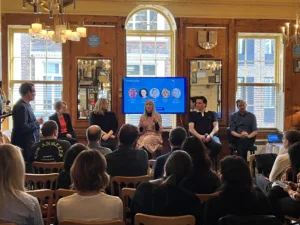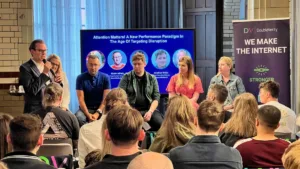Artificial intelligence (AI) has been the talk of many towns in 2023, and it’s only going to continue to be a major topic of discussion going into the new year. While digital advertising benefited from the role of AI for a number of years, the mainstream emergence of the technology has given rise to an increased number of use cases within the space.
One of the areas that AI is set to make – and is already making – a significant impact is in media buying, with the technology perfectly positioned to help marketers navigate the cookieless, privacy-focused world.
To discuss the topic, NDA recently partnered with Scibids to bring together a group of industry experts. The roundtable, chaired by NDA Editor Justin Pearse, featured Arshiya Nazir, Addressable Strategy Director, dentsu UK; Richard Bettinson, Senior Director Media Planning, Strategy & Insight, Hilton; Jonathan Greenhalgh-Macwan, Partner, Digital Planning, Wavemaker UK; Max Gold, Digital Lead, the7stars (Speaker Three); Alex Campbell, Chief Strategy Officer, Performics UK (Speaker Four); and Matt Nash, UK Managing Director at Scibids.
Entering into the privacy-first world, and the loss of third-party cookies, has meant that the digital advertising industry is having to find ways to reach people with relevant ads, while having access to less of their data.
AI has a notable role to play in driving forward the industry, and ensuring that it can reach consumers with the types of ads they actually want to see.
“With the cookie going, we know there’s going to be less data overall. And the data that’s available is going to be kept in different or disparate places,” said Scibids’ Nash. “The challenge is, well, how do I bring that data together and make sense of it and then make it actionable? To do that manually is impossible – it’ll take forever. So, having a powerful layer of technology – AI or otherwise – to enable you to do that is going to be important.”
Delivering the outcomes that matter
Perhaps the most noteworthy application of AI within media buying is through the use of it for customisation. And this is something Wavemaker has been actively using the technology for.
“We are trying to add customisation from an algorithm perspective, but also from an optimisation perspective and a creative perspective,” Greenhalgh-Macwan shared. “We have our own proprietary AI solution as well, which plugs directly into the DSP and allows us to not only analyse huge amounts of data, but also make thousands of split-second decisions. It also allows us to optimise to multiple metrics at the same time.
“From an outcome perspective, it ensures that we are delivering those outcomes and putting our brands in environments that they want to be in and are comfortable being in.”
Dentsu’s Nazir has seen AI impact the agency from more of a “ground level,” helping teams within the business access enterprise grade AI platforms, with the objective of sharing knowledge and quickly bringing differentiated innovations to market.
“On the ground level we are weaving in the benefits of AI for measuring attention, informing sustainable buying, creating basic custom bidding scripts and contextually targeting with natural language processing” said Nazir.
“We’re evolving and deploying solutions that will deliver on outcomes instead of vanity metrics. We can leverage AI assisting products to help us help our clients, optimising towards their business goals with more efficiency and statistical factoring of data .”
C-sing the AI opportunity
The shift toward putting consumer privacy first has also seen a reemergence of contextual advertising as a viable way of reaching people. And, with the power of AI, contextual has been elevated to levels far beyond what it was previously capable of.
“There’s a lot more effective contextual targeting these days,” according to the7stars’ Gold. “We’re using solutions that are really granular. We’re understanding the video. We’re understanding the audio. Wecan be contextually aligned in video environments, which previously you couldn’t really understand, apart from if it was tagged with text.
“Now, there are models that are analysing everything, picking out products and people for example. We can target specific content, increasing relevance across campaigns and have measured the positive impact this has on business objectives.
While powering the new era of contextual, AI is managing to impact an even bigger ‘C’ in a positive way as well: creativity.
Creativity has long been acknowledged as being the driving force behind successful campaigns, and the technology is helping to bring that creativity closer to the media side of digital advertising. But the technology isn’t yet capable of taking the creativity entirely away from humans.
“A good idea is still a good idea. AI is going to help you come up with the good idea. The bigger challenge is when you’re not necessarily taking an idea and thinking about the role of the channel in that,” explained Hilton’s Bettison.
“Bringing together media and creative is a key component. Agencies aren’t really set up in that way, so there’s a structural piece within that. How do you work together in that way? It’s a different way of working. The creative agencies will be embracing that change, but the ones that are very traditional are going to struggle.”
Setting the tone for the future
2024 is set to be a challenging but, ultimately, fruitful one for the digital advertising industry, as changes drive it toward being more respectful of consumers, better for the environment, and capable of delivering better results for brands.
At the heart of this is going to be the role that AI has to play in media buying, transforming the way it works in a number of positive ways.
“In media planning, everyone should be excited about AI because it drives more effective optimisation of media. We can do our jobs better because of it,” Performics’ Campbell stated. “AI has the potential to give superpowers to everyone. That’s pretty significant. It’s able to make everyone a capable data scientist, engineer, climatologist, neuroscientist, or whatever it may be. That’s incredible and transformational.
“Media planning is the thin end of the wedge. It’s a negligible part of the impact it has on society. But it’s a good example of it, because you can see the optimisation that it can drive in this self-contained space.”









